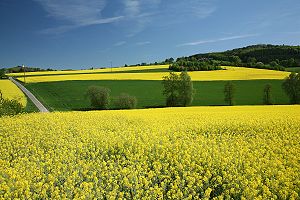- Colza oil
-
Colza oil is a nondrying oil obtained from the seeds of Brassica rapa, var. oleifera, a variety of the plant that produces turnips. Colza is extensively cultivated in France, Belgium, the United States, the Netherlands and Germany and Poland. In France, especially, the extraction of the oil is an important industry. In commerce, colza is classed with rapeseed oil, to which it is very closely allied in both source and properties. It is a comparatively nonodoriferous oil of a yellow colour, having a specific gravity varying between 0.912 and 0.920. The cake left after extraction of the oil is a valuable feed ingredient for pigs.
Uses
Colza oil is extensively used as a lubricant for machinery.
Colza oil was used extensively in European domestic lighting before the advent of coal (city) gas or kerosene. It was the preferred oil for train pot lamps, and was used for lighting railway coaches in the United Kingdom before gas lighting, and later electric lighting, were adopted. Burned in a Carcel lamp, it was part of the definition of the French standard measure for illumination, the carcel, for most of the nineteenth century. In lighthouses, for example in early Canada, colza oil was used before the introduction of mineral oil. The colza oil was used with the Argand burner because it was cheaper[1] than whale oil.
Colza oil was used in Gombault's Caustic Balsam,[2] a popular horse and human liniment at the turn of the 20th century. (Note that the ingredients listed in this link are similar to, but not the same as, the list on the actual bottle).
Among the more unusual applications of colza oil is the calming of choppy seas, where the oil modifies the surface tension of the water and rapidly smooths the surface. Rescue and recovery operations have been made far less risky in this way.[3]
More recently, colza has been cultivated in Europe as an ingredient for biodiesel fuels, and is the primary source of biodiesel in Germany.
Crisis of 2008
In April 2008, the Spanish Food Safety Agency (AESAN) cautioned that a consignment of canola oil poisoned with aniline was imported from France for industrial purposes and then introduced into the market for sale for human consumption is illegal. The Health Ministry preemptively withdrew 125 tons of oil and sent a report to the European Commission, which in turn alerted the governments of France, Italy, UK and Holland, but later reports revealed that the toxicological risk was minimal.
References
- ^ "USQUE AD MARE - Early Lights - Canadian Coast Guard". Ccg-gcc.gc.ca. 2008-03-31. http://www.ccg-gcc.gc.ca/eng/CCG/USQUE_Early_Lights. Retrieved 2010-03-14.
- ^ "Gombaults". Racehorseherbal.com. http://www.racehorseherbal.com/Herbal_Therapies/Liniments/Gombaults/gombaults.html. Retrieved 2010-03-14.
- ^ "Oil Tested in Storms at Sea. - Article Preview - The". New York Times. 2010-03-03. http://query.nytimes.com/gst/abstract.html?res=9B01E1DB1F3FEF33A25757C0A9659C94629ED7CF. Retrieved 2010-03-14.
 This article incorporates text from a publication now in the public domain: Chisholm, Hugh, ed (1911). Encyclopædia Britannica (11th ed.). Cambridge University Press.
This article incorporates text from a publication now in the public domain: Chisholm, Hugh, ed (1911). Encyclopædia Britannica (11th ed.). Cambridge University Press.Edible fats and oils Fats Bacon fat · Blubber · Butter · Clarified butter · Cocoa butter · Dripping · Duck fat · Ghee · Lard · Margarine · Niter kibbeh · Salo · Schmaltz · Shea butter · Smen · Suet · Tallow · Vegetable shorteningOils Almond oil · Argan oil · Avocado oil · Canola oil · Cashew oil · Castor oil · Coconut oil · Colza oil · Corn oil · Cottonseed oil · Fish oil · Grape seed oil · Hazelnut oil · Hemp oil · Linseed oil (flaxseed oil) · Macadamia oil · Marula oil · Mongongo nut oil · Mustard oil · Olive oil · Palm oil (palm kernel oil) · Peanut oil · Pecan oil · Perilla oil · Pine nut oil · Pistachio oil · Poppyseed oil · Pumpkin seed oil · Rapeseed oil · Rice bran oil · Safflower oil · Sesame oil · Soybean oil · Sunflower oil · Tea seed oil · Walnut oil · Watermelon seed oilSee also: List of vegetable oils · Cooking oil · Essential oil Categories:- Lubricants
- Cooking oils
- Vegetable oils
- Food ingredient stubs
- Brassicales stubs
- Materials stubs
Wikimedia Foundation. 2010.

